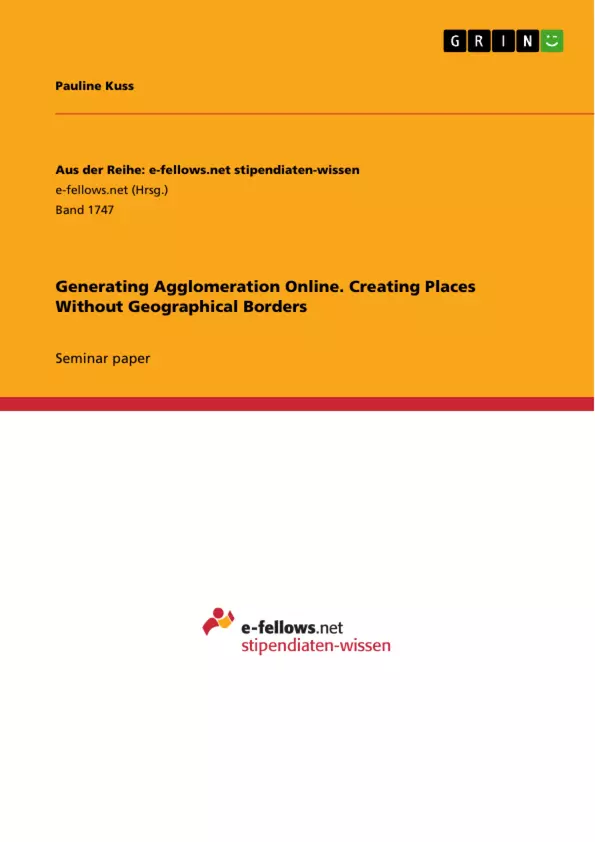This paper argues that the internet could support the creation of a "space-less place" where agglomeration effects can be re-created independent from geographic location. Addressing dominant doubts and critiques it proposes the framework of an online platform in which space-less agglomeration can occur and which thus, if correctly implemented and administered, holds great potential for innovative development in countries which find themselves unfortunately located outside the economic core region of today's world.
From the perspective of geographic economics, location factors seem to be of major importance to explain existing (global) economical orderings which, when favorable, allow for agglomeration effects such as knowledge spillovers that are necessary for innovative processes. However, the worldwide spread of the internet and its implied potential to transmit information and communication to every connected corner of the planet might make information technology the “space-shrinking technology” which ultimately renders spatial differences between places unimportant.
While scholars agree that the internet offers global access to information, a majority disbelieves in its potential to challenge geographical advantages and thus disrupt the world's economic ordering. Although internet communication allows for global connectivity it might fail to adequately provide the density, diversity, spontaneity and effective communication of tacit knowledge needed for innovative business practices.
Inhaltsverzeichnis (Table of Contents)
- I. Introduction
- II. The Model of a Space-less Online Space
- III. Evaluation of Existing Doubts
- Communication of Tacit Knowledge
- Allowing for Spontaneity, Diversity and Density
- Facilitating Trust Between Strangers
- Theories of Trust in Virtual Interactions
- Empirical Studies of Trust in Virtual Interactions
- Implications
- IV. The Importance of a Platform Culture
- Creating an Online Culture
- Facebook as an Example of an Online Culture
- Existing Literature
- Important Implications
- V. Concluding Remarks
Zielsetzung und Themenschwerpunkte (Objectives and Key Themes)
This paper explores the potential for online platforms to recreate the agglomeration effects traditionally associated with physical locations. The author proposes a model for such a platform, designed to facilitate knowledge spillovers and innovation through virtual interactions.
- The potential for online platforms to create "places" without geographical borders
- The role of trust in virtual interactions
- The importance of platform culture and community building
- The challenges of communication of tacit knowledge in online environments
- The potential of technology to shrink spatial differences and facilitate agglomeration.
Zusammenfassung der Kapitel (Chapter Summaries)
- I. Introduction: This chapter introduces the concept of agglomeration effects and how they have traditionally been dependent on geographical proximity. The author then discusses the potential of the internet to disrupt these traditional patterns and create "space-less places" online.
- II. The Model of a Space-less Online Place: This chapter presents a detailed model for a platform that seeks to recreate agglomeration effects online. The platform would facilitate virtual interactions between users, with features such as personalized profiles, randomized matching for conversations, and open discussion forums.
- III. Evaluation of Existing Doubts: This chapter addresses common arguments against the viability of online agglomeration. It discusses concerns related to the communication of tacit knowledge, spontaneity, diversity, and trust in virtual interactions. The author then argues that these concerns can be addressed through careful platform design and a focus on building a strong online community.
- IV. The Importance of a Platform Culture: This chapter explores the importance of creating a vibrant and engaging online culture to support the platform's objectives. The author discusses the role of community building, user engagement, and the potential for platforms to influence individual behavior and attitudes.
Schlüsselwörter (Keywords)
The primary focus of this paper is on agglomeration effects, online platforms, knowledge spillovers, virtual interaction, trust, platform culture, tacit knowledge, and the potential of technology to redefine geographical space.
- Quote paper
- Pauline Kuss (Author), 2015, Generating Agglomeration Online. Creating Places Without Geographical Borders, Munich, GRIN Verlag, https://www.hausarbeiten.de/document/317890


